
Open-WebUI-Functions
Open-WebUI-Functions is a collection of custom pipelines, filters, and integrations designed to enhance Open WebUI. These functions enable seamless interactions with Azure AI, N8N, Google Gemini and other AI models, providing dynamic request handling, preprocessing, and automation.
Stars: 196
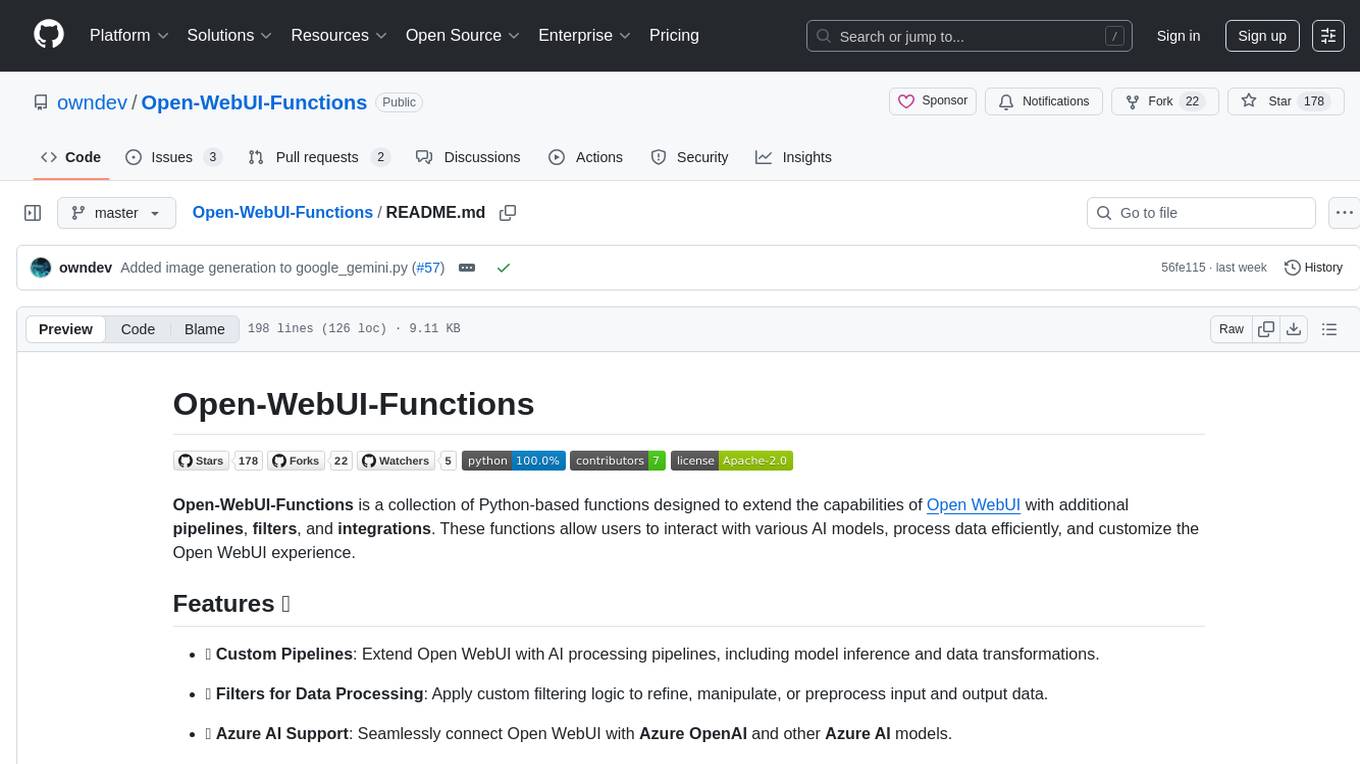
Open-WebUI-Functions is a collection of Python-based functions that extend Open WebUI with custom pipelines, filters, and integrations. Users can interact with AI models, process data efficiently, and customize the Open WebUI experience. It includes features like custom pipelines, data processing filters, Azure AI support, N8N workflow integration, flexible configuration, secure API key management, and support for both streaming and non-streaming processing. The functions require an active Open WebUI instance, may need external AI services like Azure AI, and admin access for installation. Security features include automatic encryption of sensitive information like API keys. Pipelines include Azure AI Foundry, N8N, Infomaniak, and Google Gemini. Filters like Time Token Tracker measure response time and token usage. Integrations with Azure AI, N8N, Infomaniak, and Google are supported. Contributions are welcome, and the project is licensed under Apache License 2.0.
README:
Open-WebUI-Functions is a collection of Python-based functions designed to extend the capabilities of Open WebUI with additional pipelines, filters, and integrations. These functions allow users to interact with various AI models, process data efficiently, and customize the Open WebUI experience.
-
🧩 Custom Pipelines: Extend Open WebUI with AI processing pipelines, including model inference and data transformations.
-
🔍 Filters for Data Processing: Apply custom filtering logic to refine, manipulate, or preprocess input and output data.
-
🤝 Azure AI Support: Seamlessly connect Open WebUI with Azure OpenAI and other Azure AI models.
-
🤝 N8N Workflow Integration: Enable interactions with N8N for automation.
-
📱 Flexible Configuration: Use environment variables to adjust function settings dynamically.
-
🚀 Streaming and Non-Streaming Support: Handle both real-time and batch processing efficiently.
-
🛡️ Secure API Key Management: Automatic encryption of sensitive information like API keys.
To use these functions, ensure the following:
-
An Active Open WebUI Instance: You must have Open WebUI installed and running.
-
Required AI Services (if applicable): Some pipelines require external AI services, such as Azure AI.
-
Admin Access: To install functions in Open WebUI, you must have administrator privileges.
To install and configure functions in Open WebUI, follow these steps:
-
Ensure Admin Access:
- You must be an admin in Open WebUI to install functions.
-
Access Admin Settings:
- Navigate to the Admin Settings section in Open WebUI.
-
Go to the Function Tab:
- Open the Functions tab in the admin panel.
-
Create a New Function:
- Click Add New Function.
- Copy the function code from this repository and paste it into the function editor.
-
Set Environment Variables (if required):
- Some functions require API keys or specific configurations via environment variables.
- Set WEBUI_SECRET_KEY for secure encryption of sensitive API keys.
-
Save and Activate:
- Save the function, and it will be available for use within Open WebUI.
The functions include a built-in encryption mechanism for sensitive information:
- Automatic Encryption: API keys and other sensitive data are automatically encrypted when stored.
- Encrypted Storage: Values are stored with an "encrypted:" prefix followed by the encrypted data.
- Transparent Usage: The encryption/decryption happens automatically when values are accessed.
- No Configuration Required: Works out-of-the-box when WEBUI_SECRET_KEY is set.
To enable encryption:
# Set this in your Open WebUI environment or .env file
WEBUI_SECRET_KEY="your-secure-random-string"Pipelines are processing functions that extend Open WebUI with custom AI models, external integrations, and data manipulation logic.
- Enables interaction with Azure OpenAI and other Azure AI models.
- Supports multiple Azure AI models selection via the
AZURE_AI_MODELenvironment variable (e.g.gpt-4o;gpt-4o-mini). - Filters valid parameters to ensure clean requests.
- Handles both streaming and non-streaming responses.
- Provides configurable error handling and timeouts.
- Predefined models for easy access.
- Supports encryption of sensitive information like API keys.
🔗 Azure AI Pipeline in Open WebUI
2. N8N Pipeline
- Integrates Open WebUI with N8N, an automation and workflow platform.
- Sends messages from Open WebUI to an N8N webhook.
- Supports real-time message processing with dynamic field handling.
- Enables automation of AI-generated responses within an N8N workflow.
- Supports encryption of sensitive information like API keys.
- Here is an example N8N workflow for N8N Pipeline
3. Infomaniak
- Integrates Open WebUI with Infomaniak, a Swiss web hosting and cloud services provider.
- Sends messages from Open WebUI to an Infomaniak AI Tool.
- Supports encryption of sensitive information like API keys.
🔗 Infomaniak Pipeline in Open WebUI
- Integrates Open WebUI with Google Gemini, a generative AI model by Google.
- Integration with Google Generative AI or Vertex AI API for content generation.
- Sends messages from Open WebUI to Google Gemini.
- Supports encryption of sensitive information like API keys.
- Supports both streaming and non-streaming responses (streaming automatically disabled for image generation models).
- Supports thinking and reasoning capabilities.
- Provides configurable error handling and timeouts.
- Advanced Image Processing: Optimized image handling with configurable compression, resizing, and quality settings.
- Configurable Parameters: Environment variables for image optimization (quality, max dimensions, format conversion).
- Grounding with Google search with google_search_tool.py filter
- Ability to forward User Headers and change gemini base url
- Native tool calling support
🔗 Google Gemini Pipeline in Open WebUI
🔗 Learn More About Google Gemini
Filters allow for preprocessing and postprocessing of data within Open WebUI.
- Measures response time and token usage for AI interactions.
- Supports tracking of total token usage and per-message token counts.
- Can calculate token usage for all messages or only a subset.
- Uses OpenAI's
tiktokenlibrary for token counting (only accurate for OpenAI models). - Optional: Can send logs to Azure Log Analytics Workspace.
🔗 Time Token Tracker in Open WebUI
🔗 How to Setup Azure Log Analytics
Look here for Azure AI Integration.
Look here for N8N Integration.
Look here for Infomaniak Integration.
Look here for Google Gemini Integration.
We accept different types of contributions, including some that don't require you to write a single line of code. For detailed instructions on how to get started with our project, see about contributing to Open-WebUI-Functions.
This project is licensed under the Apache License 2.0 - see the LICENSE file for details. 📄
If you have any questions, suggestions, or need assistance, please open an issue to connect with us! 🤝
Created by owndev - Let's make Open WebUI even more amazing together! 💪
For Tasks:
Click tags to check more tools for each tasksFor Jobs:
Alternative AI tools for Open-WebUI-Functions
Similar Open Source Tools

Open-WebUI-Functions
Open-WebUI-Functions is a collection of Python-based functions that extend Open WebUI with custom pipelines, filters, and integrations. Users can interact with AI models, process data efficiently, and customize the Open WebUI experience. It includes features like custom pipelines, data processing filters, Azure AI support, N8N workflow integration, flexible configuration, secure API key management, and support for both streaming and non-streaming processing. The functions require an active Open WebUI instance, may need external AI services like Azure AI, and admin access for installation. Security features include automatic encryption of sensitive information like API keys. Pipelines include Azure AI Foundry, N8N, Infomaniak, and Google Gemini. Filters like Time Token Tracker measure response time and token usage. Integrations with Azure AI, N8N, Infomaniak, and Google are supported. Contributions are welcome, and the project is licensed under Apache License 2.0.
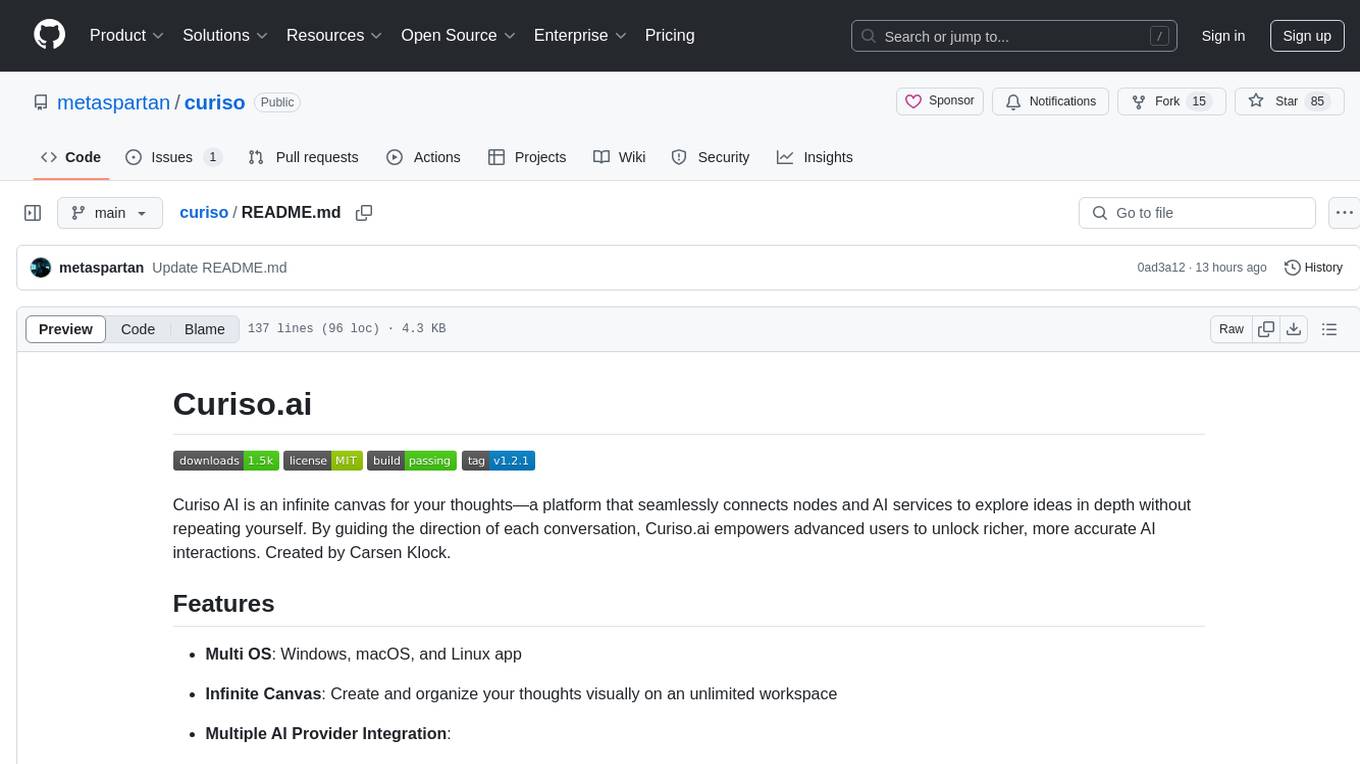
curiso
Curiso AI is an infinite canvas platform that connects nodes and AI services to explore ideas without repetition. It empowers advanced users to unlock richer AI interactions. Features include multi OS support, infinite canvas, multiple AI provider integration, local AI inference provider integration, custom model support, model metrics, RAG support, local Transformers.js embedding models, inference parameters customization, multiple boards, vision model support, customizable interface, node-based conversations, and secure local encrypted storage. Curiso also offers a Solana token for exclusive access to premium features and enhanced AI capabilities.
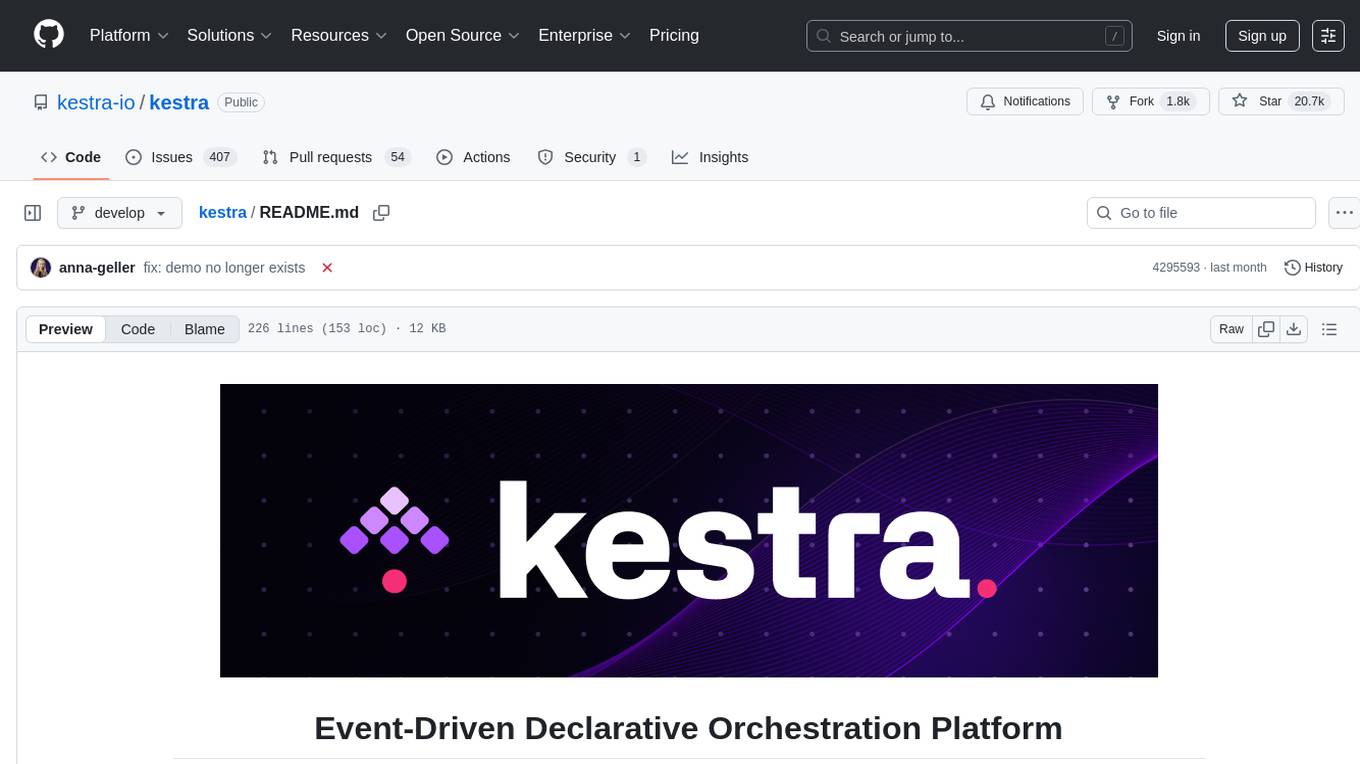
kestra
Kestra is an open-source event-driven orchestration platform that simplifies building scheduled and event-driven workflows. It offers Infrastructure as Code best practices for data, process, and microservice orchestration, allowing users to create reliable workflows using YAML configuration. Key features include everything as code with Git integration, event-driven and scheduled workflows, rich plugin ecosystem for data extraction and script running, intuitive UI with syntax highlighting, scalability for millions of workflows, version control friendly, and various features for structure and resilience. Kestra ensures declarative orchestration logic management even when workflows are modified via UI, API calls, or other methods.
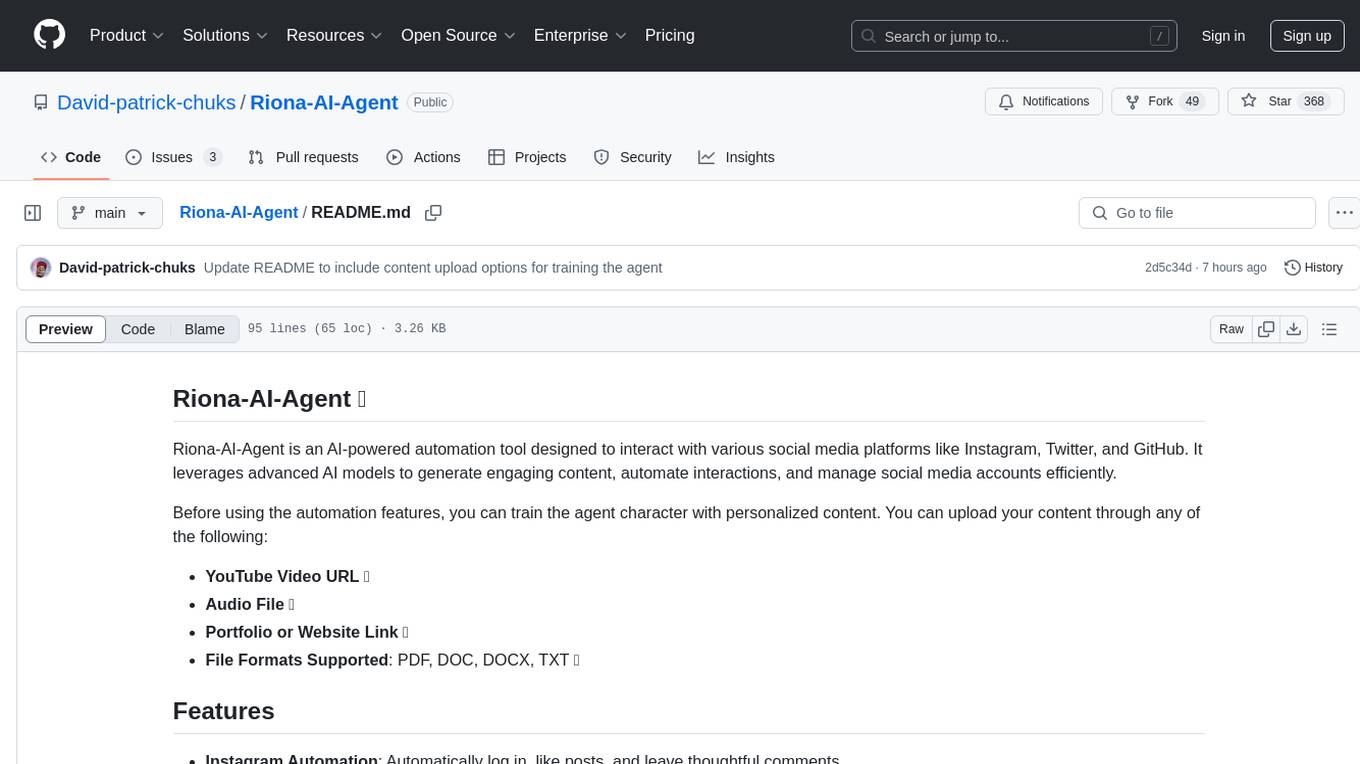
Riona-AI-Agent
Riona-AI-Agent is a versatile AI chatbot designed to assist users in various tasks. It utilizes natural language processing and machine learning algorithms to understand user queries and provide accurate responses. The chatbot can be integrated into websites, applications, and messaging platforms to enhance user experience and streamline communication. With its customizable features and easy deployment, Riona-AI-Agent is suitable for businesses, developers, and individuals looking to automate customer support, provide information, and engage with users in a conversational manner.
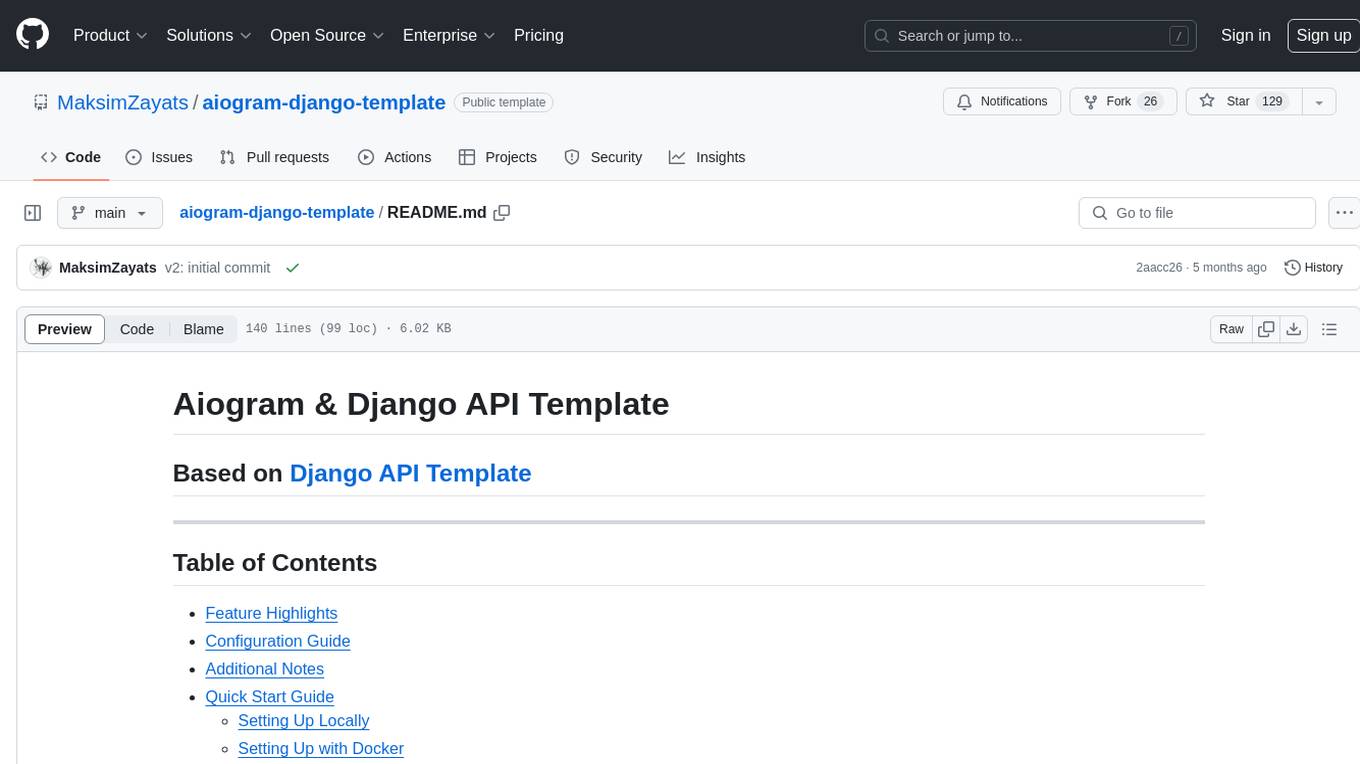
aiogram-django-template
Aiogram & Django API Template is a robust and secure Django template with advanced features like Docker integration, Celery for asynchronous tasks, Sentry for error tracking, Django Rest Framework for building APIs, and more. It provides scalability options, up-to-date dependencies, and integration with AWS S3 for storage. The template includes configuration guides for secrets, ports, performance tuning, application settings, CORS and CSRF settings, and database configuration. Security, scalability, and monitoring are emphasized for efficient Django API development.
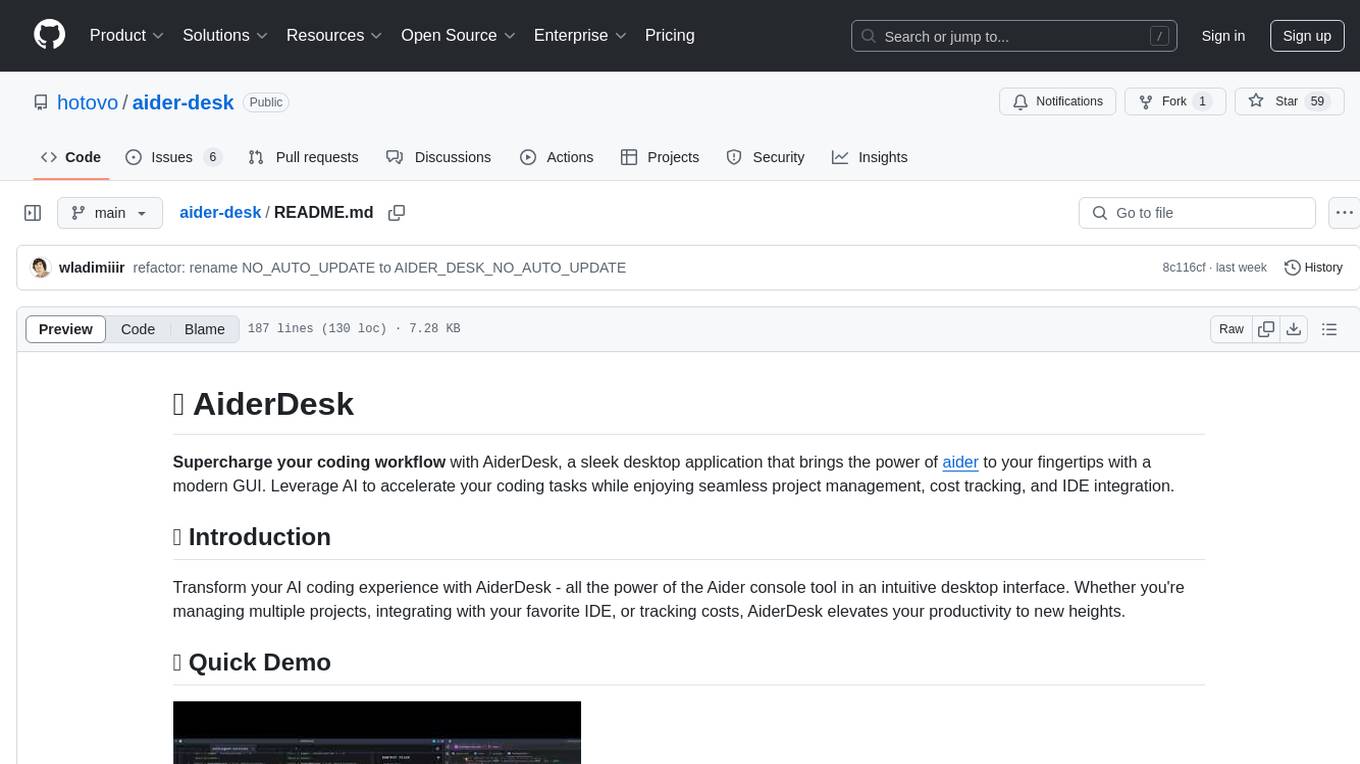
aider-desk
AiderDesk is a desktop application that enhances coding workflow by leveraging AI capabilities. It offers an intuitive GUI, project management, IDE integration, MCP support, settings management, cost tracking, structured messages, visual file management, model switching, code diff viewer, one-click reverts, and easy sharing. Users can install it by downloading the latest release and running the executable. AiderDesk also supports Python version detection and auto update disabling. It includes features like multiple project management, context file management, model switching, chat mode selection, question answering, cost tracking, MCP server integration, and MCP support for external tools and context. Development setup involves cloning the repository, installing dependencies, running in development mode, and building executables for different platforms. Contributions from the community are welcome following specific guidelines.
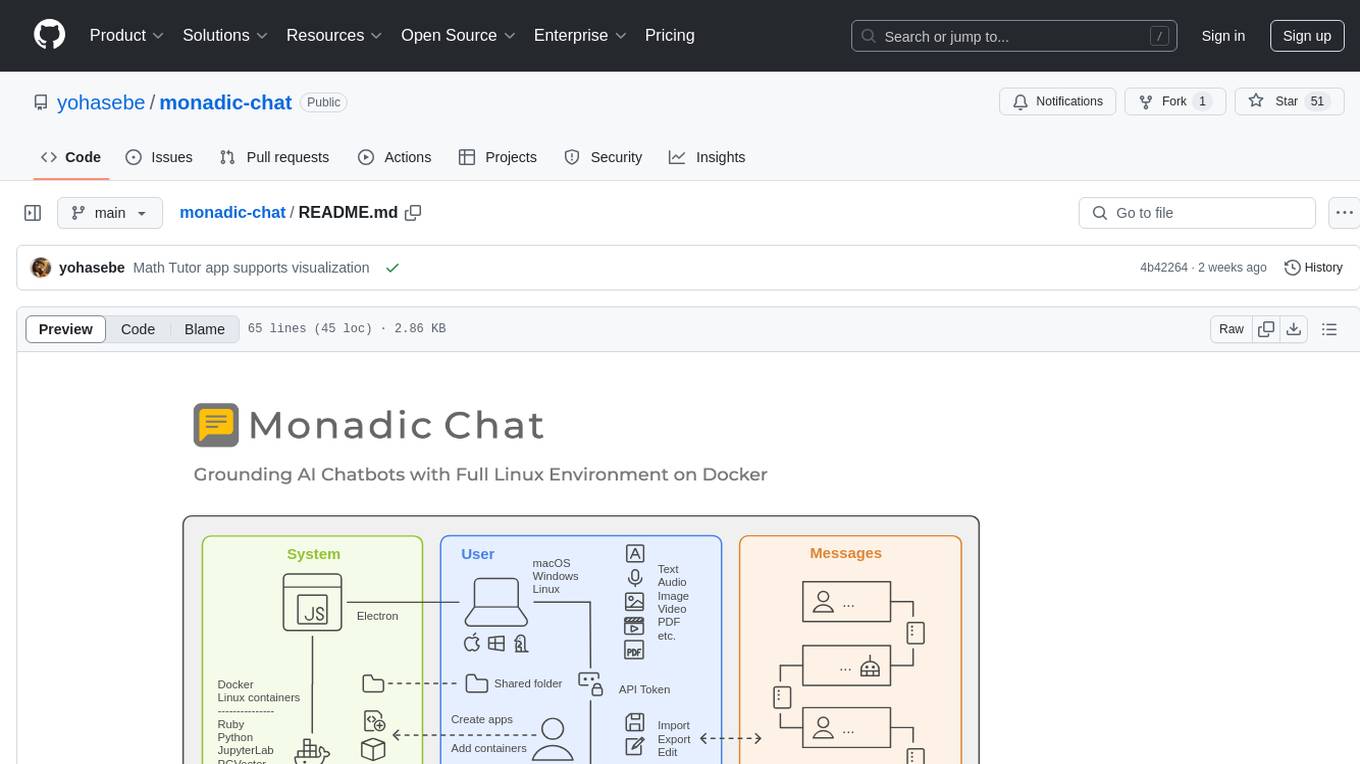
monadic-chat
Monadic Chat is a locally hosted web application designed to create and utilize intelligent chatbots. It provides a Linux environment on Docker to GPT and other LLMs, enabling the execution of advanced tasks that require external tools. The tool supports voice interaction, image and video recognition and generation, and AI-to-AI chat, making it useful for using AI and developing various applications. It is available for Mac, Windows, and Linux (Debian/Ubuntu) with easy-to-use installers.
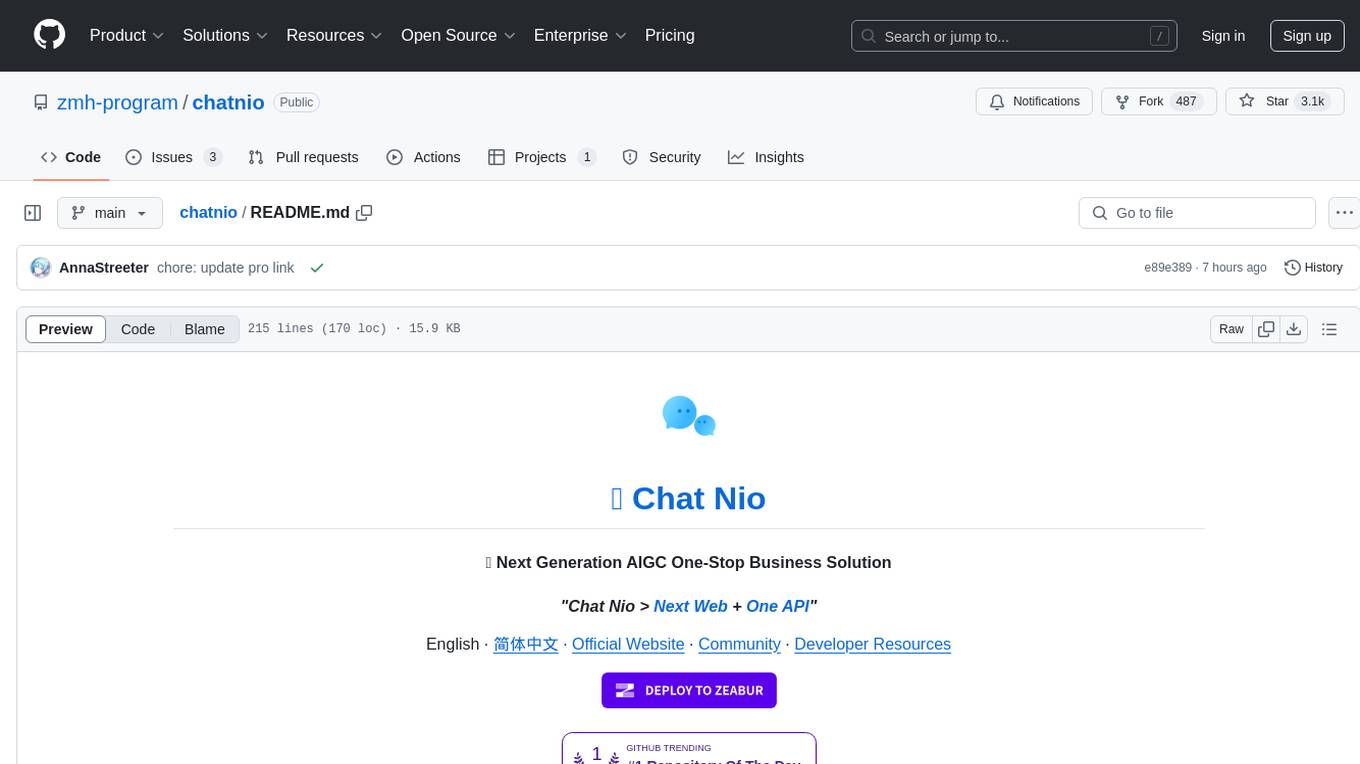
chatnio
Chat Nio is a next-generation AIGC one-stop business solution that combines the advantages of frontend-oriented lightweight deployment projects with powerful API distribution systems. It offers rich model support, beautiful UI design, complete Markdown support, multi-theme support, internationalization support, text-to-image support, powerful conversation sync, model market & preset system, rich file parsing, full model internet search, Progressive Web App (PWA) support, comprehensive backend management, multiple billing methods, innovative model caching, and additional features. The project aims to address limitations in conversation synchronization, billing, file parsing, conversation URL sharing, channel management, and API call support found in existing AIGC commercial sites, while also providing a user-friendly interface design and C-end features.
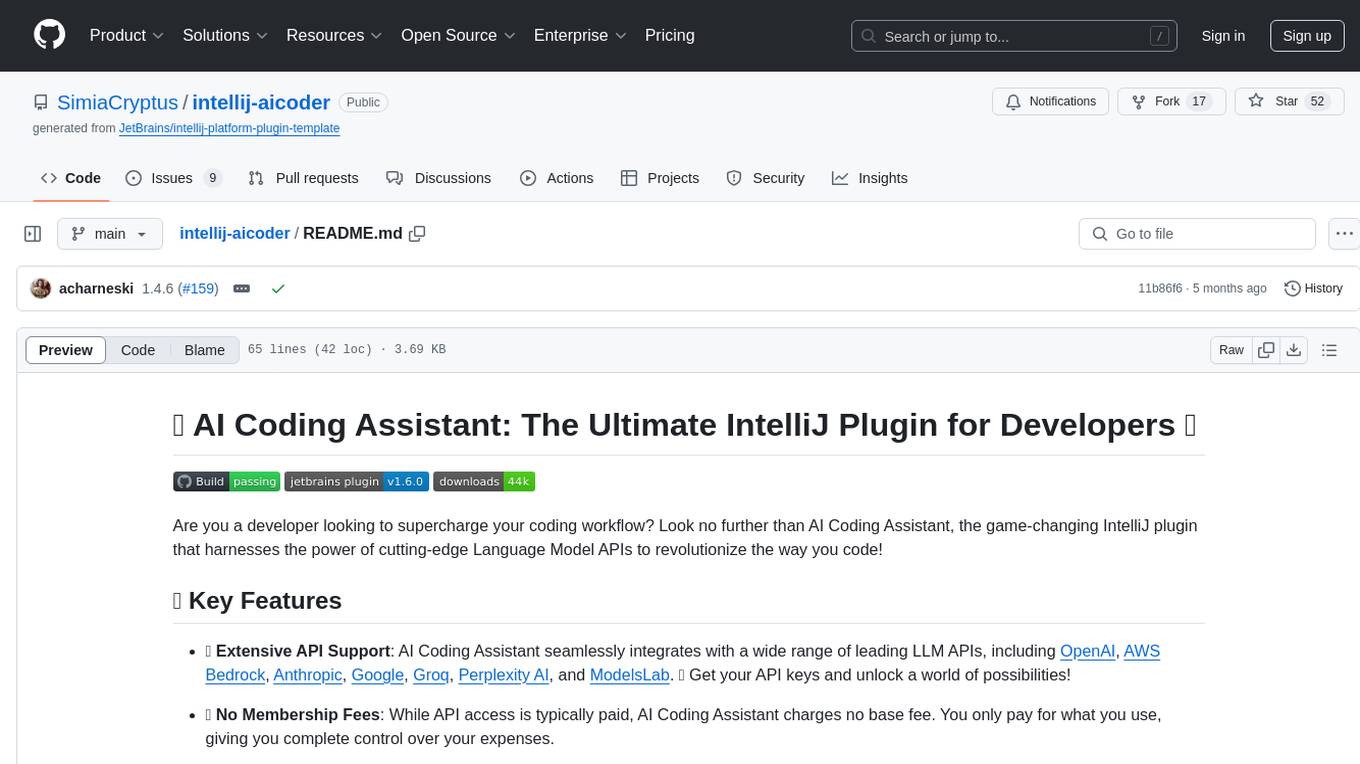
intellij-aicoder
AI Coding Assistant is a free and open-source IntelliJ plugin that leverages cutting-edge Language Model APIs to enhance developers' coding experience. It seamlessly integrates with various leading LLM APIs, offers an intuitive toolbar UI, and allows granular control over API requests. With features like Code & Patch Chat, Planning with AI Agents, Markdown visualization, and versatile text processing capabilities, this tool aims to streamline coding workflows and boost productivity.
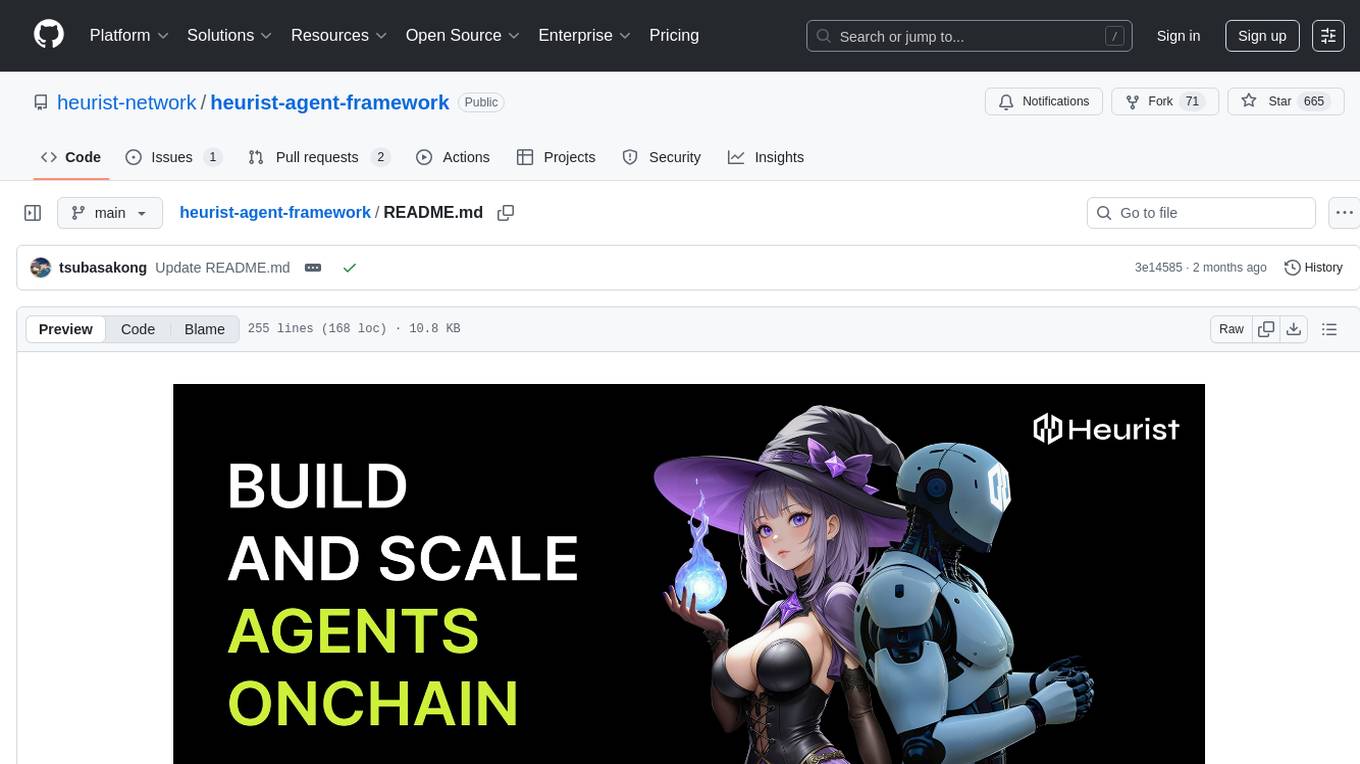
heurist-agent-framework
Heurist Agent Framework is a flexible multi-interface AI agent framework that allows processing text and voice messages, generating images and videos, interacting across multiple platforms, fetching and storing information in a knowledge base, accessing external APIs and tools, and composing complex workflows using Mesh Agents. It supports various platforms like Telegram, Discord, Twitter, Farcaster, REST API, and MCP. The framework is built on a modular architecture and provides core components, tools, workflows, and tool integration with MCP support.
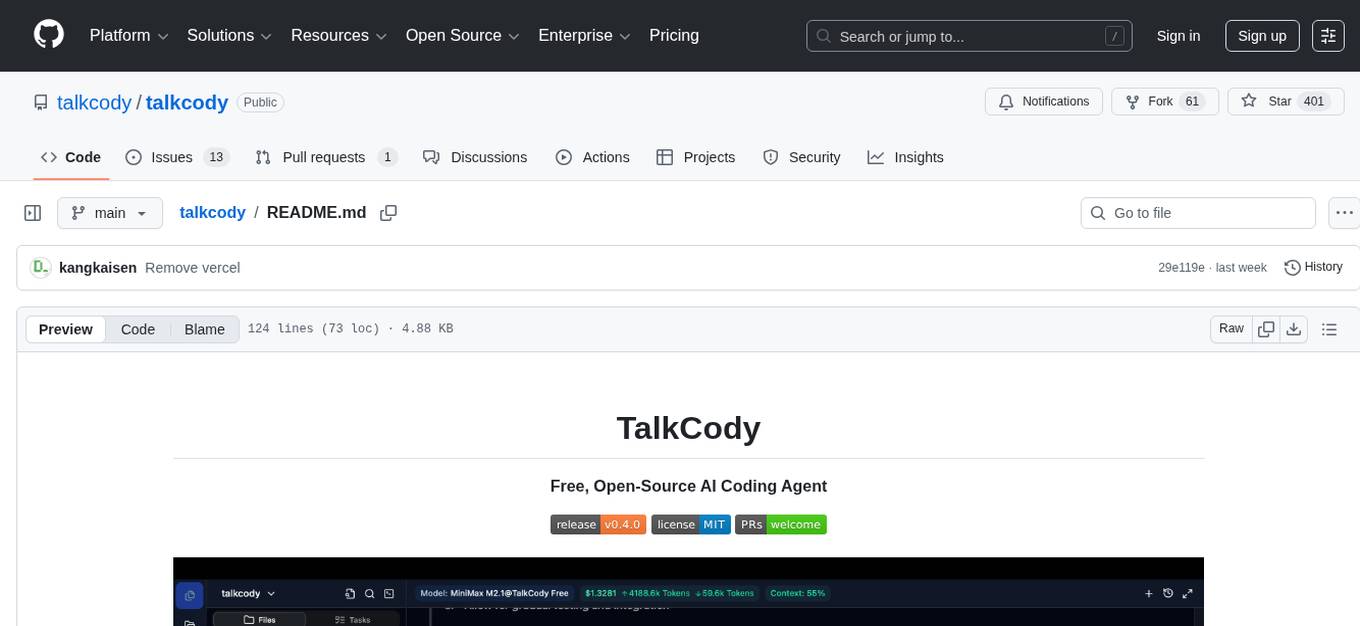
talkcody
TalkCody is a free, open-source AI coding agent designed for developers who value speed, cost, control, and privacy. It offers true freedom to use any AI model without vendor lock-in, maximum speed through unique four-level parallelism, and complete privacy as everything runs locally without leaving the user's machine. With professional-grade features like multimodal input support, MCP server compatibility, and a marketplace for agents and skills, TalkCody aims to enhance development productivity and flexibility.
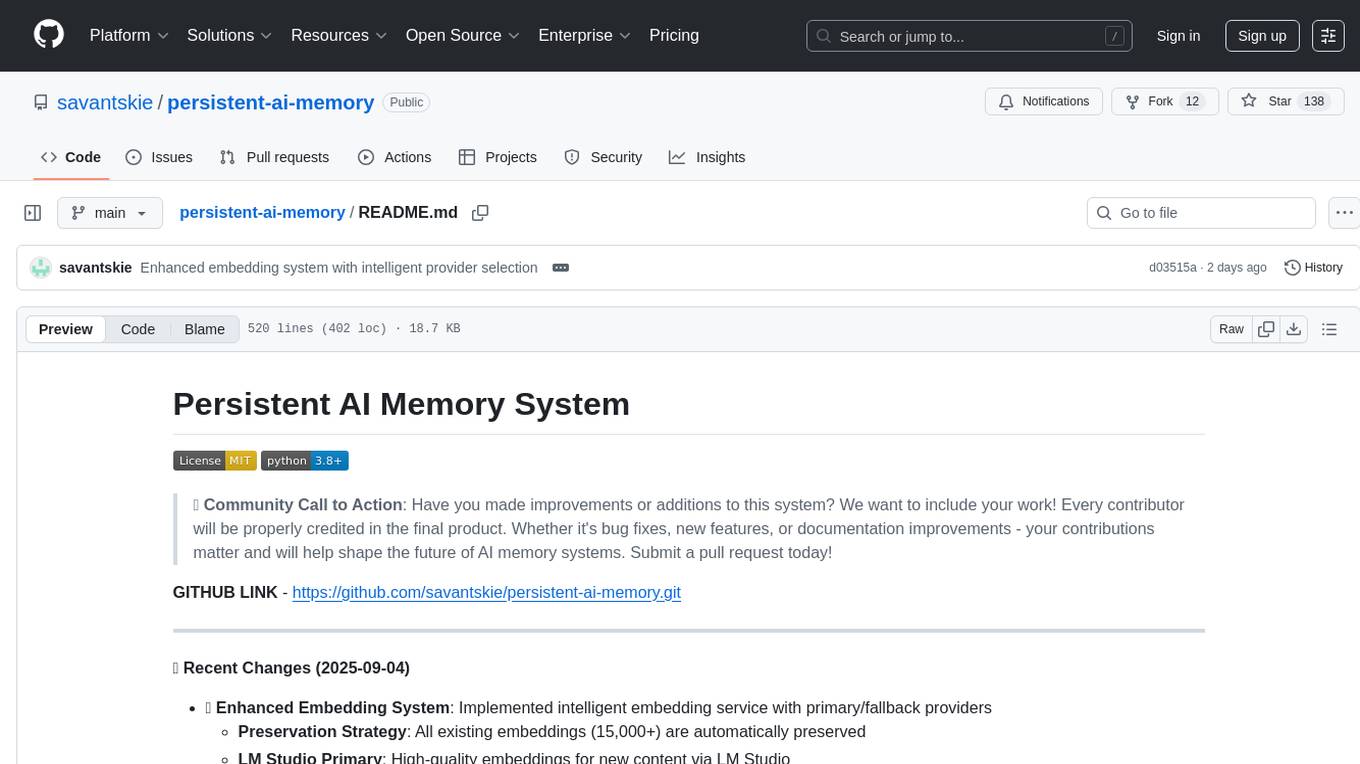
persistent-ai-memory
Persistent AI Memory System is a comprehensive tool that offers persistent, searchable storage for AI assistants. It includes features like conversation tracking, MCP tool call logging, and intelligent scheduling. The system supports multiple databases, provides enhanced memory management, and offers various tools for memory operations, schedule management, and system health checks. It also integrates with various platforms like LM Studio, VS Code, Koboldcpp, Ollama, and more. The system is designed to be modular, platform-agnostic, and scalable, allowing users to handle large conversation histories efficiently.
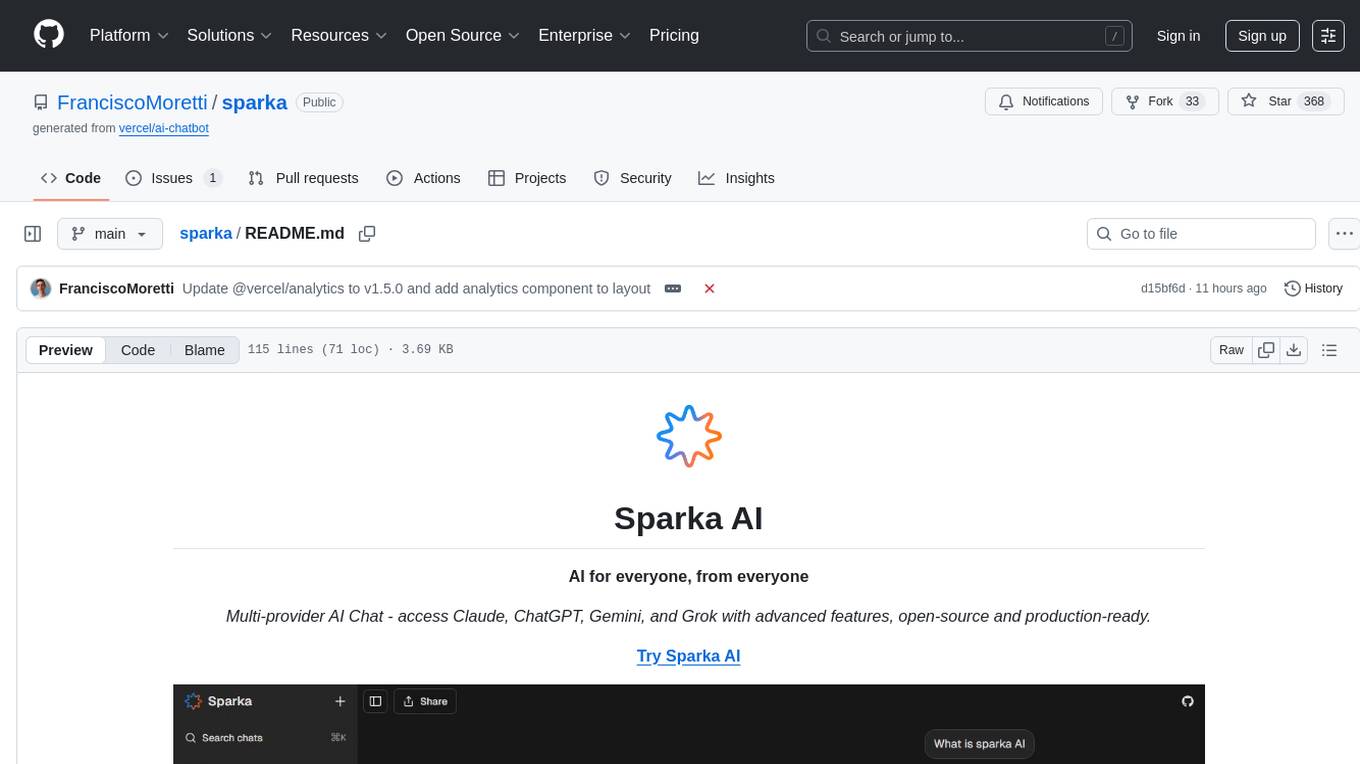
sparka
Sparka AI is a multi-provider AI chat tool that allows users to access various AI models like Claude, GPT-5, Gemini, and Grok through a single interface. It offers features such as document analysis, image generation, code execution, and research tools without the need for multiple subscriptions. The tool is open-source, production-ready, and provides capabilities for collaboration, secure authentication, attachment support, AI-powered image generation, syntax highlighting, resumable streams, chat branching, chat sharing, deep research, code execution, document creation, and web analytics. Built with modern technologies for scalability and performance, Sparka AI integrates with Vercel AI SDK, tRPC, Drizzle ORM, PostgreSQL, Redis, and AI SDK Gateway.
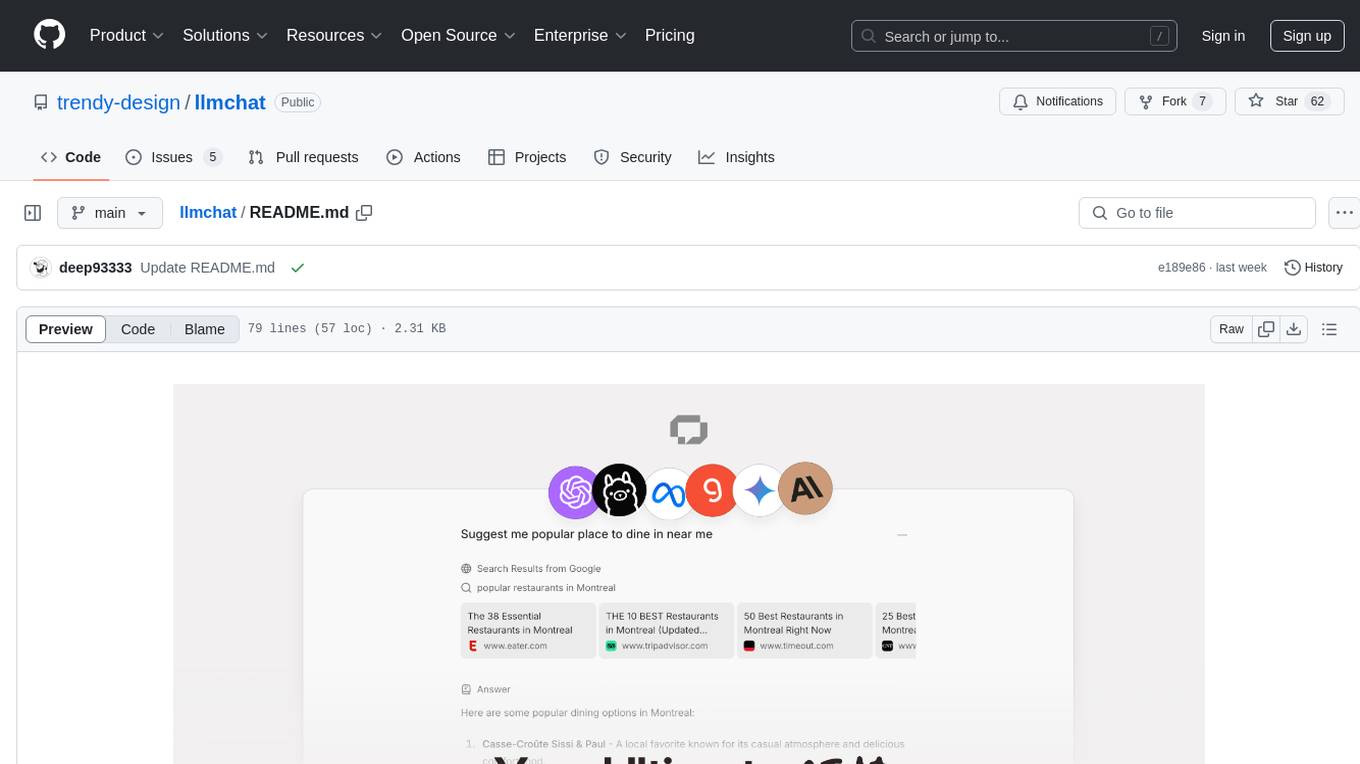
llmchat
LLMChat is an all-in-one AI chat interface that supports multiple language models, offers a plugin library for enhanced functionality, enables web search capabilities, allows customization of AI assistants, provides text-to-speech conversion, ensures secure local data storage, and facilitates data import/export. It also includes features like knowledge spaces, prompt library, personalization, and can be installed as a Progressive Web App (PWA). The tech stack includes Next.js, TypeScript, Pglite, LangChain, Zustand, React Query, Supabase, Tailwind CSS, Framer Motion, Shadcn, and Tiptap. The roadmap includes upcoming features like speech-to-text and knowledge spaces.
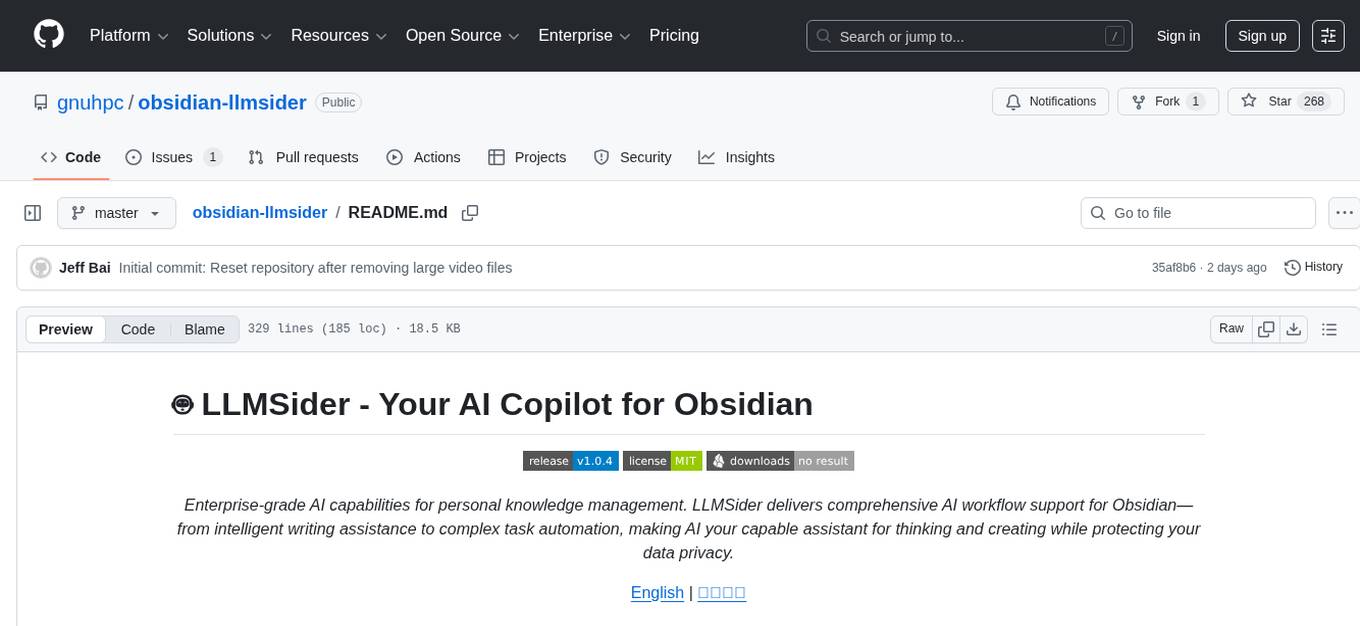
obsidian-llmsider
LLMSider is an AI assistant plugin for Obsidian that offers flexible multi-model support, deep workflow integration, privacy-first design, and a professional tool ecosystem. It provides comprehensive AI capabilities for personal knowledge management, from intelligent writing assistance to complex task automation, making AI a capable assistant for thinking and creating while ensuring data privacy.
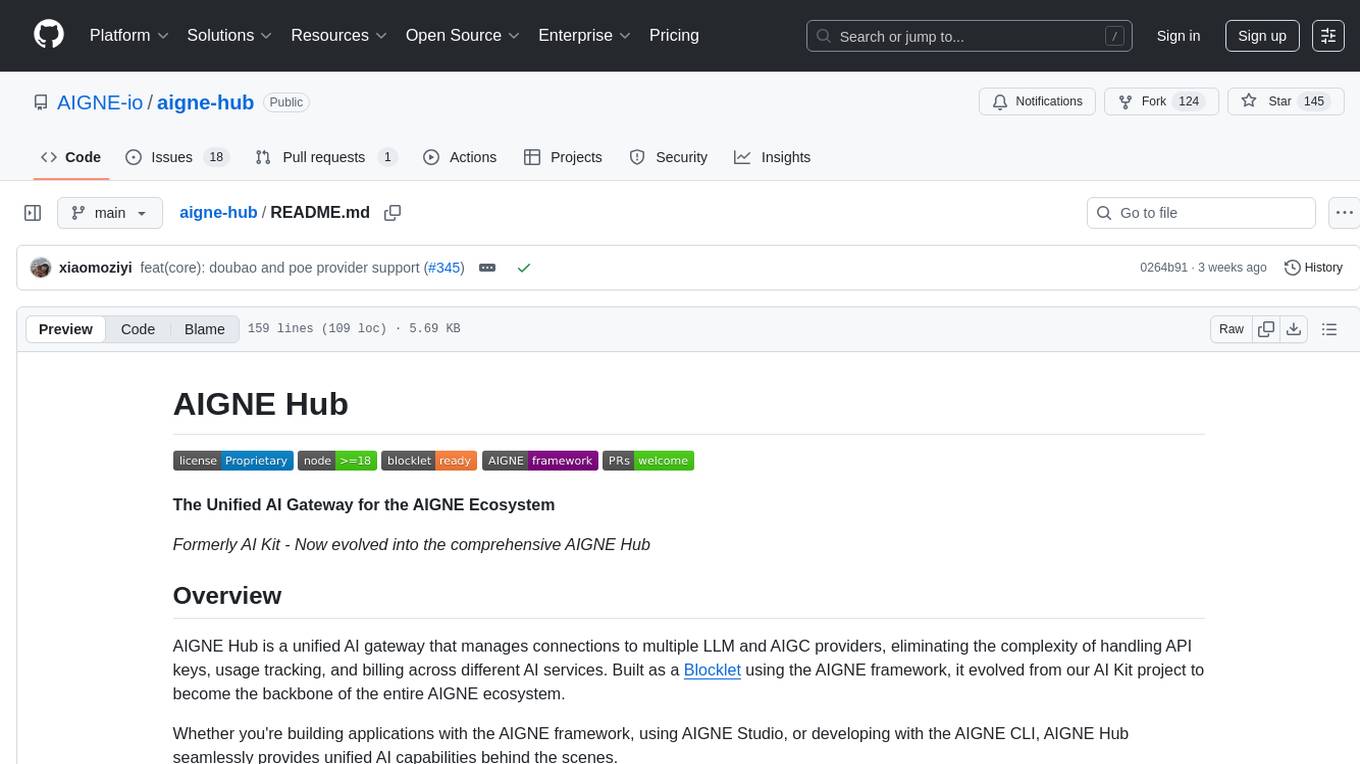
aigne-hub
AIGNE Hub is a unified AI gateway that manages connections to multiple LLM and AIGC providers, eliminating the complexity of handling API keys, usage tracking, and billing across different AI services. It provides self-hosting capabilities, multi-provider management, unified security, usage analytics, flexible billing, and seamless integration with the AIGNE framework. The tool supports various AI providers and deployment scenarios, catering to both enterprise self-hosting and service provider modes. Users can easily deploy and configure AI providers, enable billing, and utilize core capabilities such as chat completions, image generation, embeddings, and RESTful APIs. AIGNE Hub ensures secure access, encrypted API key management, user permissions, and audit logging. Built with modern technologies like AIGNE Framework, Node.js, TypeScript, React, SQLite, and Blocklet for cloud-native deployment.
For similar tasks
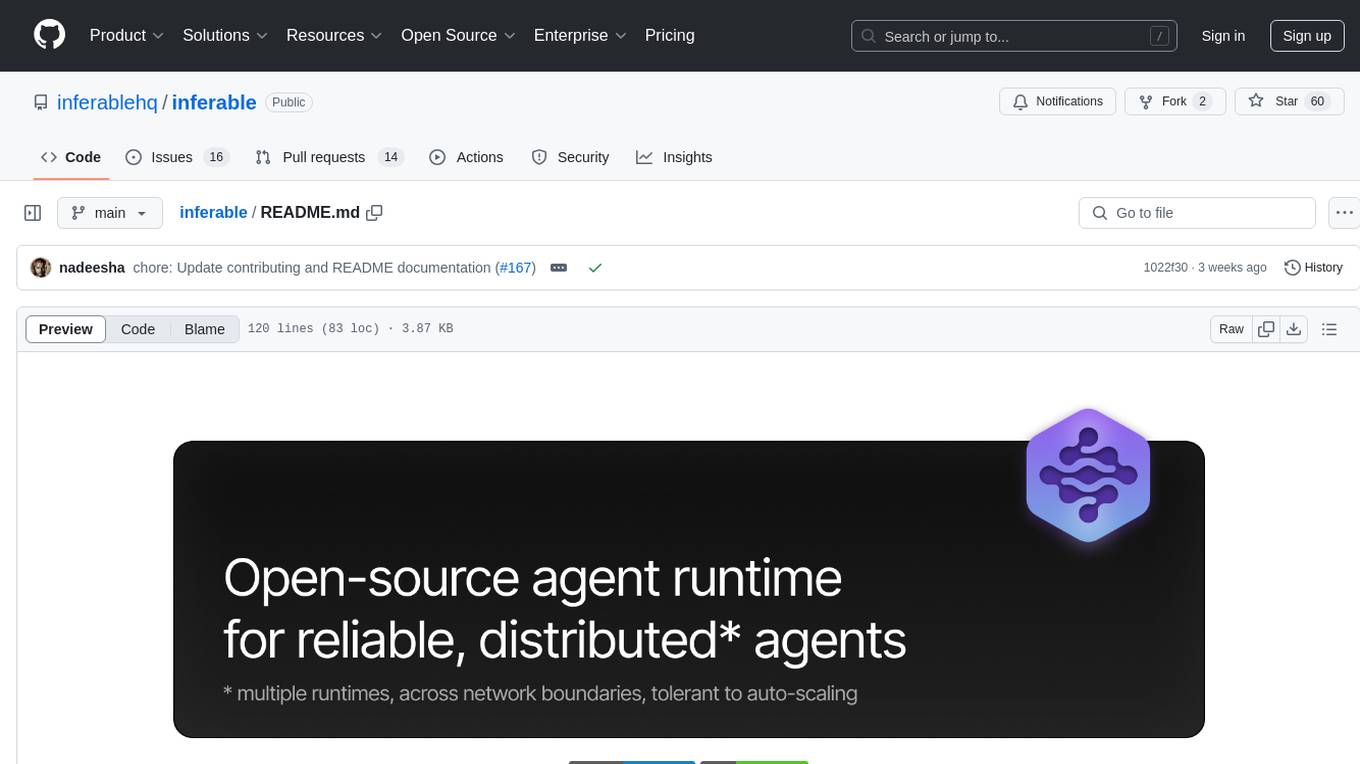
inferable
Inferable is an open source platform that helps users build reliable LLM-powered agentic automations at scale. It offers a managed agent runtime, durable tool calling, zero network configuration, multiple language support, and is fully open source under the MIT license. Users can define functions, register them with Inferable, and create runs that utilize these functions to automate tasks. The platform supports Node.js/TypeScript, Go, .NET, and React, and provides SDKs, core services, and bootstrap templates for various languages.
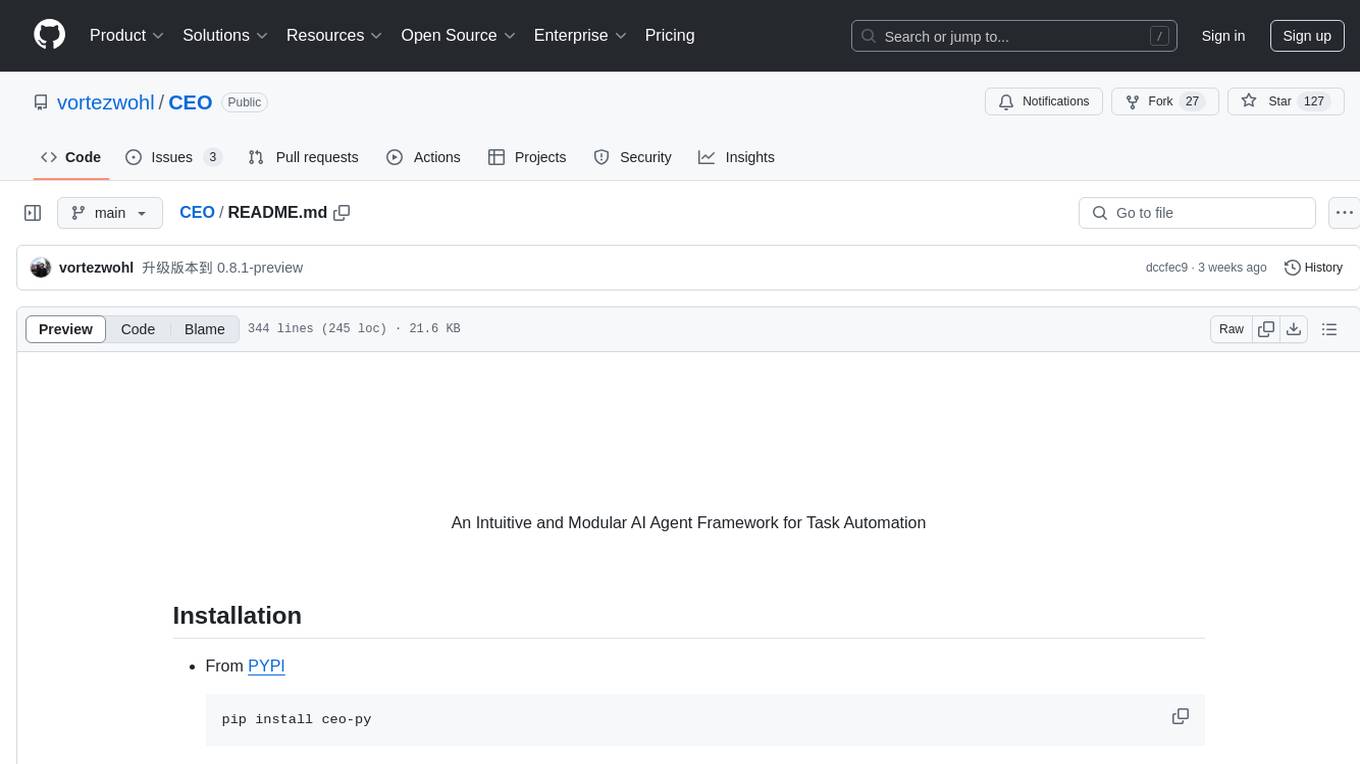
CEO
CEO is an intuitive and modular AI agent framework designed for task automation. It provides a flexible environment for building agents with specific abilities and personalities, allowing users to assign tasks and interact with the agents to automate various processes. The framework supports multi-agent collaboration scenarios and offers functionalities like instantiating agents, granting abilities, assigning queries, and executing tasks. Users can customize agent personalities and define specific abilities using decorators, making it easy to create complex automation workflows.
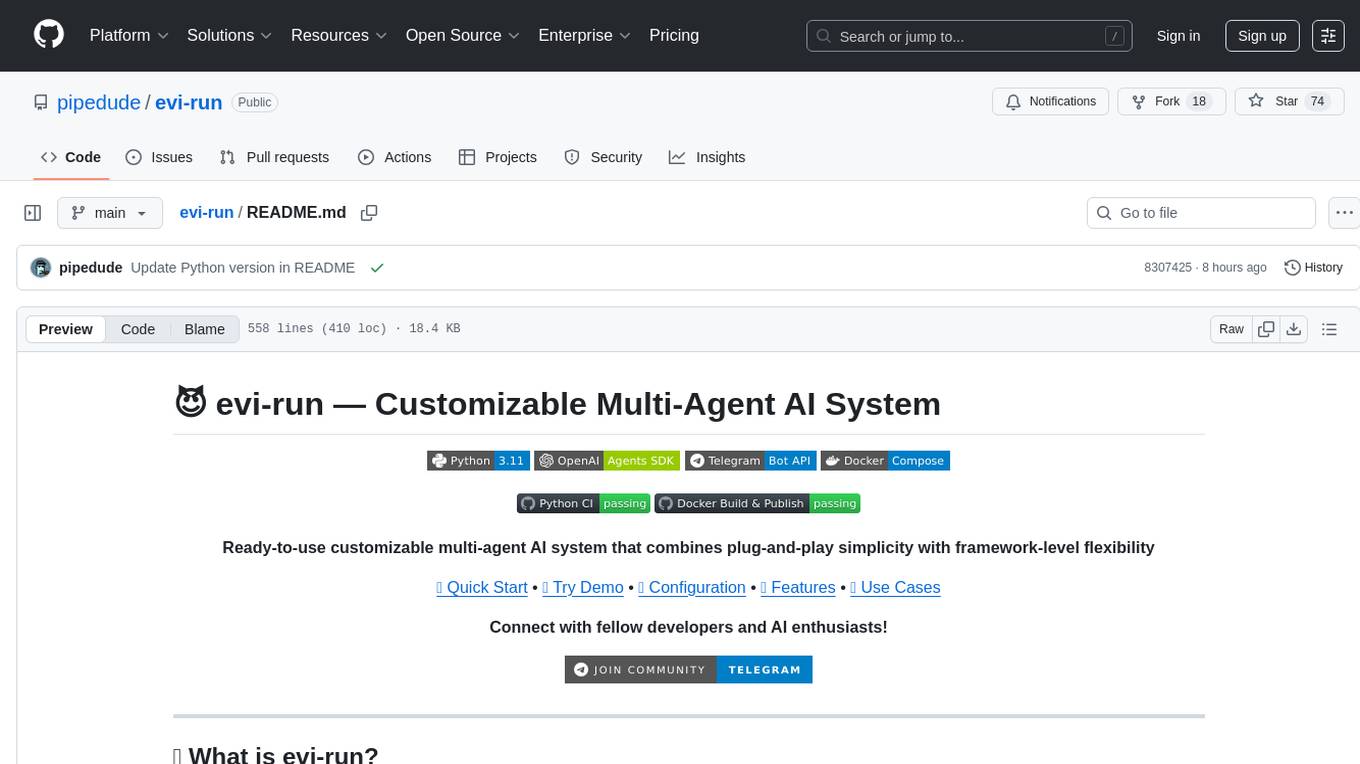
evi-run
evi-run is a powerful, production-ready multi-agent AI system built on Python using the OpenAI Agents SDK. It offers instant deployment, ultimate flexibility, built-in analytics, Telegram integration, and scalable architecture. The system features memory management, knowledge integration, task scheduling, multi-agent orchestration, custom agent creation, deep research, web intelligence, document processing, image generation, DEX analytics, and Solana token swap. It supports flexible usage modes like private, free, and pay mode, with upcoming features including NSFW mode, task scheduler, and automatic limit orders. The technology stack includes Python 3.11, OpenAI Agents SDK, Telegram Bot API, PostgreSQL, Redis, and Docker & Docker Compose for deployment.

Open-WebUI-Functions
Open-WebUI-Functions is a collection of Python-based functions that extend Open WebUI with custom pipelines, filters, and integrations. Users can interact with AI models, process data efficiently, and customize the Open WebUI experience. It includes features like custom pipelines, data processing filters, Azure AI support, N8N workflow integration, flexible configuration, secure API key management, and support for both streaming and non-streaming processing. The functions require an active Open WebUI instance, may need external AI services like Azure AI, and admin access for installation. Security features include automatic encryption of sensitive information like API keys. Pipelines include Azure AI Foundry, N8N, Infomaniak, and Google Gemini. Filters like Time Token Tracker measure response time and token usage. Integrations with Azure AI, N8N, Infomaniak, and Google are supported. Contributions are welcome, and the project is licensed under Apache License 2.0.
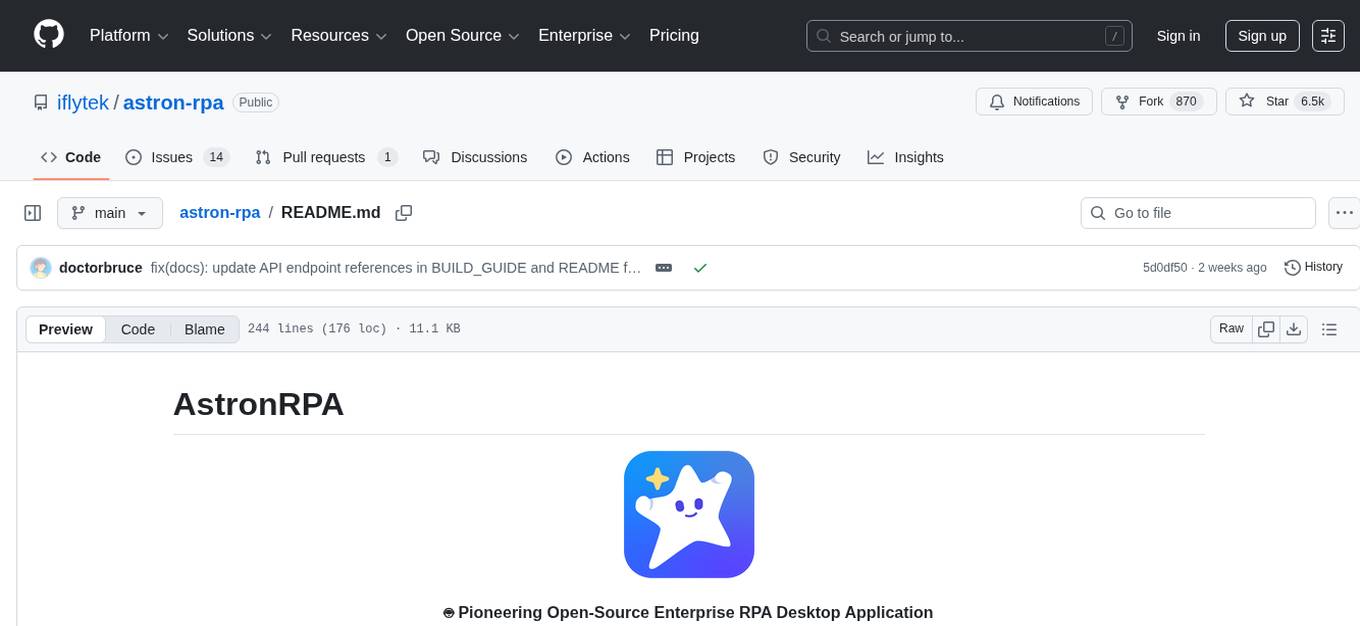
astron-rpa
AstronRPA is an enterprise-grade Robotic Process Automation (RPA) desktop application that supports low-code/no-code development. It enables users to rapidly build workflows and automate desktop software and web pages. The tool offers comprehensive automation support for various applications, highly component-based design, enterprise-grade security and collaboration features, developer-friendly experience, native agent empowerment, and multi-channel trigger integration. It follows a frontend-backend separation architecture with components for system operations, browser automation, GUI automation, AI integration, and more. The tool is deployed via Docker and designed for complex RPA scenarios.
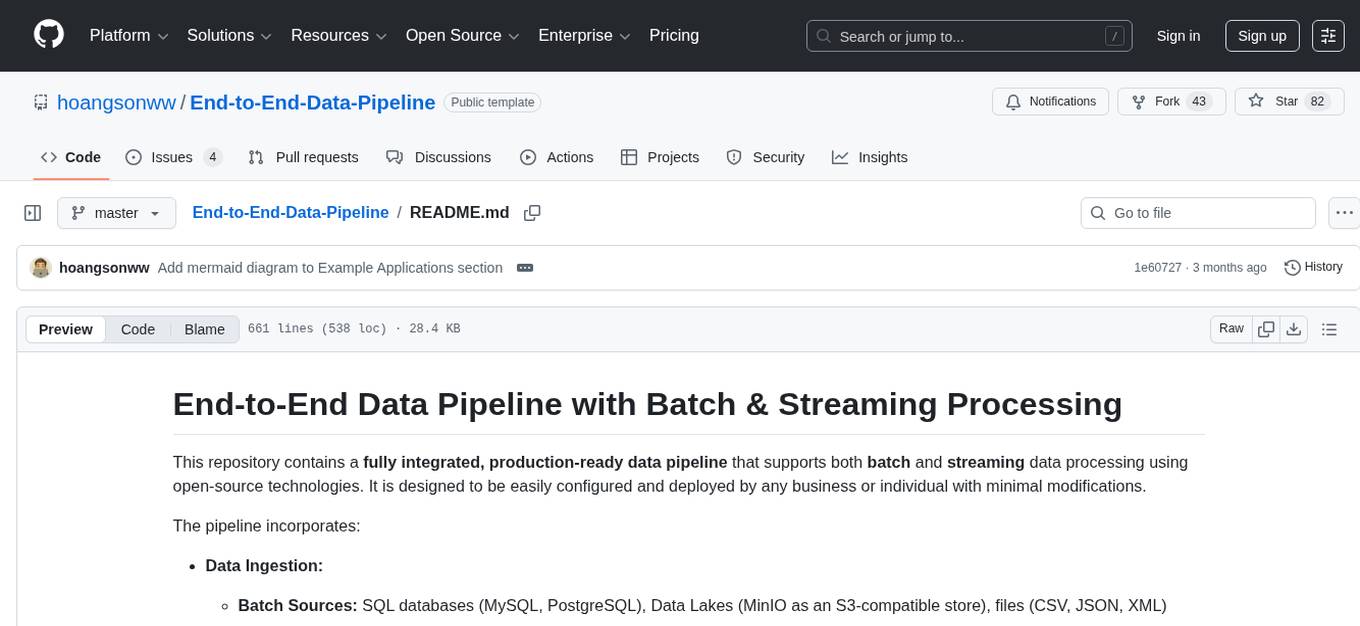
End-to-End-Data-Pipeline
End-to-End-Data-Pipeline is a comprehensive tool for building and managing data pipelines from data ingestion to data visualization. It provides a seamless workflow for processing, transforming, and analyzing data at scale. The tool supports various data sources and formats, making it versatile for different data processing needs. With End-to-End-Data-Pipeline, users can easily automate data workflows, monitor pipeline performance, and collaborate on data projects efficiently.
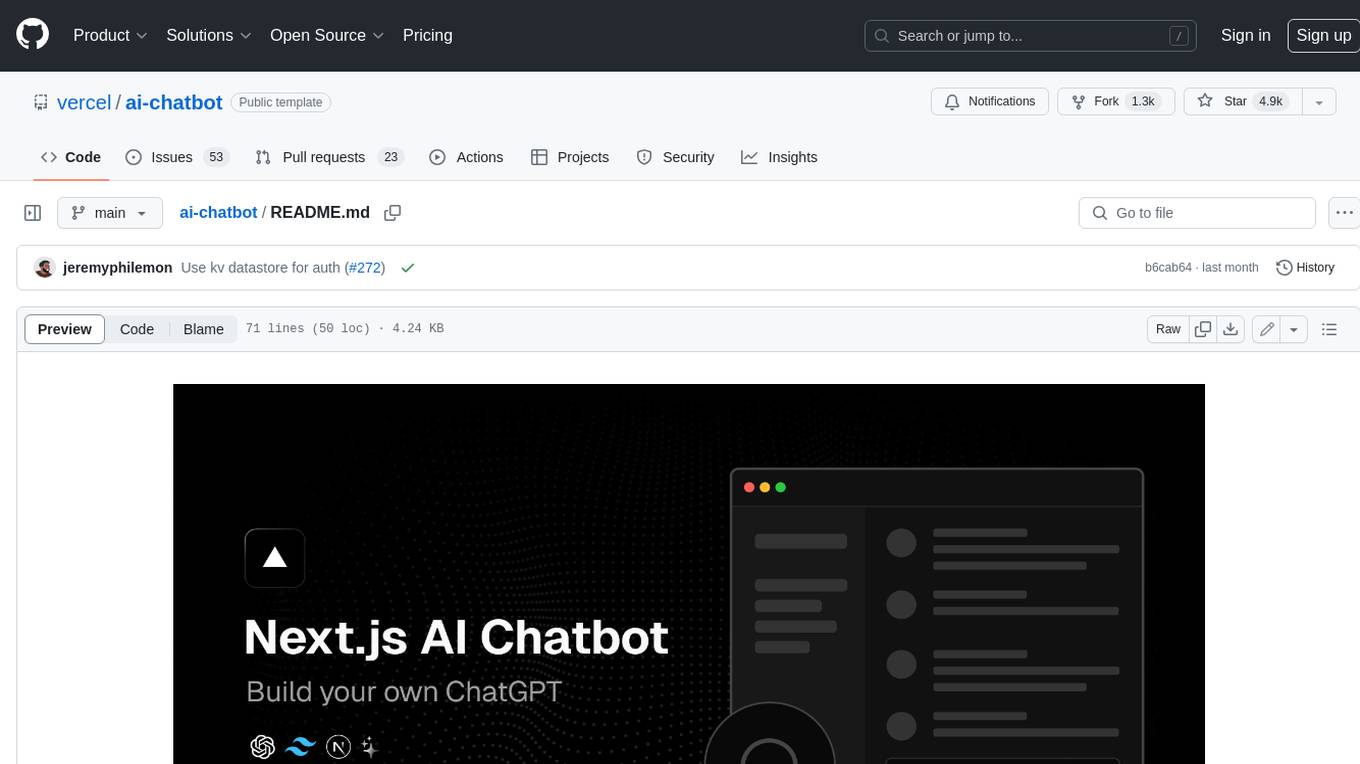
ai-chatbot
Next.js AI Chatbot is an open-source app template for building AI chatbots using Next.js, Vercel AI SDK, OpenAI, and Vercel KV. It includes features like Next.js App Router, React Server Components, Vercel AI SDK for streaming chat UI, support for various AI models, Tailwind CSS styling, Radix UI for headless components, chat history management, rate limiting, session storage with Vercel KV, and authentication with NextAuth.js. The template allows easy deployment to Vercel and customization of AI model providers.
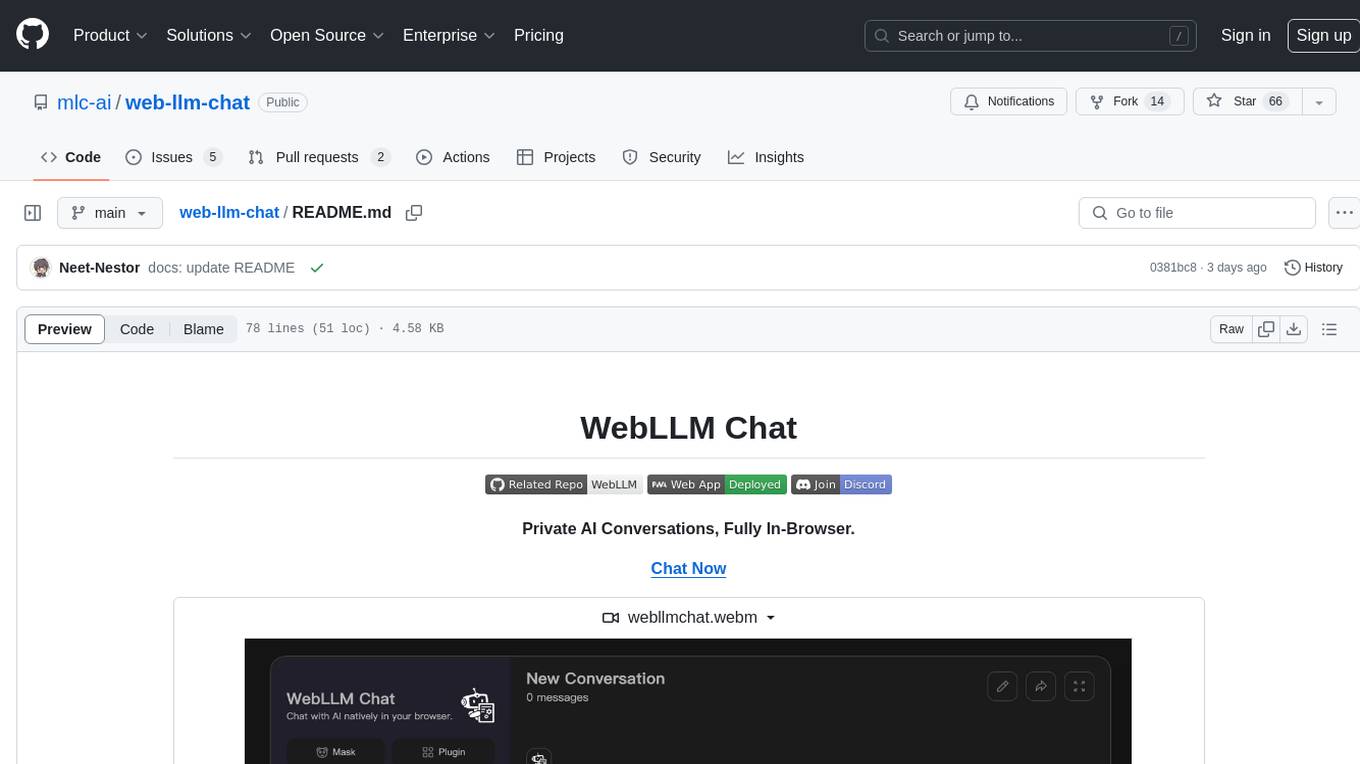
web-llm-chat
WebLLM Chat is a private AI chat interface that combines WebLLM with a user-friendly design, leveraging WebGPU to run large language models natively in your browser. It offers browser-native AI experience with WebGPU acceleration, guaranteed privacy as all data processing happens locally, offline accessibility, user-friendly interface with markdown support, and open-source customization. The project aims to democratize AI technology by making powerful tools accessible directly to end-users, enhancing the chatting experience and broadening the scope for deployment of self-hosted and customizable language models.
For similar jobs

sweep
Sweep is an AI junior developer that turns bugs and feature requests into code changes. It automatically handles developer experience improvements like adding type hints and improving test coverage.

teams-ai
The Teams AI Library is a software development kit (SDK) that helps developers create bots that can interact with Teams and Microsoft 365 applications. It is built on top of the Bot Framework SDK and simplifies the process of developing bots that interact with Teams' artificial intelligence capabilities. The SDK is available for JavaScript/TypeScript, .NET, and Python.

ai-guide
This guide is dedicated to Large Language Models (LLMs) that you can run on your home computer. It assumes your PC is a lower-end, non-gaming setup.

classifai
Supercharge WordPress Content Workflows and Engagement with Artificial Intelligence. Tap into leading cloud-based services like OpenAI, Microsoft Azure AI, Google Gemini and IBM Watson to augment your WordPress-powered websites. Publish content faster while improving SEO performance and increasing audience engagement. ClassifAI integrates Artificial Intelligence and Machine Learning technologies to lighten your workload and eliminate tedious tasks, giving you more time to create original content that matters.

chatbot-ui
Chatbot UI is an open-source AI chat app that allows users to create and deploy their own AI chatbots. It is easy to use and can be customized to fit any need. Chatbot UI is perfect for businesses, developers, and anyone who wants to create a chatbot.

BricksLLM
BricksLLM is a cloud native AI gateway written in Go. Currently, it provides native support for OpenAI, Anthropic, Azure OpenAI and vLLM. BricksLLM aims to provide enterprise level infrastructure that can power any LLM production use cases. Here are some use cases for BricksLLM: * Set LLM usage limits for users on different pricing tiers * Track LLM usage on a per user and per organization basis * Block or redact requests containing PIIs * Improve LLM reliability with failovers, retries and caching * Distribute API keys with rate limits and cost limits for internal development/production use cases * Distribute API keys with rate limits and cost limits for students

uAgents
uAgents is a Python library developed by Fetch.ai that allows for the creation of autonomous AI agents. These agents can perform various tasks on a schedule or take action on various events. uAgents are easy to create and manage, and they are connected to a fast-growing network of other uAgents. They are also secure, with cryptographically secured messages and wallets.

griptape
Griptape is a modular Python framework for building AI-powered applications that securely connect to your enterprise data and APIs. It offers developers the ability to maintain control and flexibility at every step. Griptape's core components include Structures (Agents, Pipelines, and Workflows), Tasks, Tools, Memory (Conversation Memory, Task Memory, and Meta Memory), Drivers (Prompt and Embedding Drivers, Vector Store Drivers, Image Generation Drivers, Image Query Drivers, SQL Drivers, Web Scraper Drivers, and Conversation Memory Drivers), Engines (Query Engines, Extraction Engines, Summary Engines, Image Generation Engines, and Image Query Engines), and additional components (Rulesets, Loaders, Artifacts, Chunkers, and Tokenizers). Griptape enables developers to create AI-powered applications with ease and efficiency.





